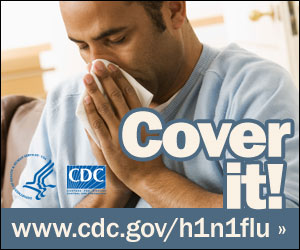H1N1 is a subtype of type A influenza virus, the most common virus to cause influenza in humans. The technical term for the virus is H1N1 Influenza A or H1N1/09 Influenza A. It has also been called “Swine Flu” since it does contain some genetic material from influenza virus found in North American swine (pigs). It also contains genetic material from three other influenza viruses: North American avian influenza, human influenza and swine influenza found in Asia and Europe. More information on the virus can be found here.
Since it is a hybrid virus, few people have natural immunity to it. Those who have partial immunity from infection have likely been exposed to parts of the virus that have been contained in influenza viruses that have circulated in years past.
The good news is the genetic structure of the virus has remained stable. However, influenza viruses have a tendency to undergo rapid mutation which could result in a much more virulent and deadly strain that may not be detected until it has infected and perhaps killed many people.
How can I minimize my chances of contracting H1N1?
 1) Get the H1N1 vaccine when it becomes available – we recommend that all Wabash students and staff get immunized when vaccine is available unless they have a contraindication to receiving vaccine.
1) Get the H1N1 vaccine when it becomes available – we recommend that all Wabash students and staff get immunized when vaccine is available unless they have a contraindication to receiving vaccine.
2) Wash your hands frequently with soap and water for at least 20 seconds (sing Happy Birthday twice) or use hand sanitizer.
3) Cough and sneeze into a tissue and throw it away. If you don’t have a tissue, cough into your clothing or elbow. Do not cough on your hands.
4) Stay away from ill persons.
5) Clean surfaces that you touch frequently using an anti-viral disinfectant like Lysol® and be sure to read the directions for proper use.
6) Get proper rest.
7) Get proper nutrition.
What are the symptoms of influenza?
• Rapid onset of symptoms
• Fever over 100ºF (37.8ºC) (note that the absence of fever does not mean the absence of infection)
• Cough
• Sore throat
• Headache
• Stuffy/runny nose.jpg) • Muscle aches
• Muscle aches
• Fatigue/exhaustion
What should I do if I get sick?
Go to the Wabash website and read this
Go to this website
Is there a test available to determine if I have H1N1?
Yes, but specific testing for H1N1 will only be done at “sentinel sites” in Indiana. There is a non-specific flu test available which you may be given in the Student Health Center if indicated and available.
Can people die from influenza?
Yes. The virus itself can overwhelm the body’s immune system, especially in those who have poor immune function to begin with. It is more likely to cause death in young infants who have immature immune systems and fragile respiratory symptoms. It has also caused death in those between the ages of 6 months and 24 years. Many people die from “secondary infections” such as bacterial pneumonia that may follow an initial infection with influenza virus.
 How is Influenza spread?
How is Influenza spread?
The virus is found in respiratory secretions. When a person coughs or sneezes, millions of viruses are released into the air and are deposited on surfaces where the respiratory droplets land. People can inhale the infected respiratory droplets. People who cough or sneeze on their hand and then touch surfaces or other people can spread the virus as well. When a person touches a surface covered with the virus and then touches their mouth, nose or eyes, the virus can infect the respiratory tract.
What is the incubation period for influenza?
It may take up to a week after exposure to develop symptoms.
How long does influenza last?
Anywhere from one to two weeks.
Can I catch H1N1 by eating pork?
No – it is only spread through exposure to infected humans and their respiratory secretions.
When will H1N1 vaccine be available?
It is anticipated that H1N1 vaccine will be ready for distribution sometime in late October to early November. All vaccine in Montgomery County will be distributed via the Montgomery County Health Department (MCHD).
Who should receive H1N1 vaccine?
At this time, CDC is recommending vaccine administration using a “closed pod” methodology to specific groups of people who are at the highest risk for developing complications (including death) from H1N1. The goal of this strategy is to first protect those individuals who are most vulnerable and then roll out the vaccine to everyone else in a mass vaccination campaign as it becomes available. It is anticipated that there will be enough vaccine to immunize all who desire it, but that it may be well into the H1N1 epidemic before enough vaccine will be available.
Groups currently targeted to receive vaccine (in order):
• Pregnant Women because they are at higher risk of complications and can potentially provide protection to infants who cannot be vaccinated.
• Household contacts and caregivers for children younger than 6 months of age because younger infants are at higher risk of influenza-related complications and cannot be vaccinated. Vaccination of those in close contact with infants less than 6 months might help protect the infants by “cocooning” them from the virus.
• Healthcare and emergency services personnel because infections among healthcare workers have been reported and this can be a potential source of infection for vulnerable patients. Also, increased absenteeism in this population could reduce healthcare system capacity.
• All people from 6 months through 24 years old.
• Children from 6 months through 18 years of age because we have seen many cases in day care settings which increases the likelihood of disease spread.
• Young adults 19-24 years of age because we have seen many cases of novel H1N1 in these healthy young adults and they often live, work and study in close proximity, and they are frequently a mobile population.
• Persons aged 25-64 years who have health conditions associated with higher risk medical complications from influenza (see below).
Current studies indicate that the risk of infection among persons 65 or older is less than the risk for younger age groups. This is likely due to these persons being exposed to a related influenza virus earlier in their lives that has left them with some residual cross immunity to H1N1.
What is the cost of the vaccine?
Since the vaccine is being distributed by the federal government, there will be no cost for the vaccine. There may be a small charge for administration.
Do I still need to get seasonal influenza vaccine?
Absolutely – seasonal influenza can be just as deadly as H1N1. Receiving novel H1N1 vaccine will not protect you from getting seasonal influenza.
Who should not receive H1N1 or seasonal influenza vaccine?
• Those who are allergic to eggs or egg protein
• Those who have had previous reactions to influenza vaccine
What medical conditions are considered “high risk” for developing severe infection and possibly death?
• Children younger than 5 years.
• People older than 65 years (though they are less likely to contract H1N1 disease).
• Children younger than 18 years who are on long-term aspirin therapy.
• Pregnant women.
• Those diagnosed with asthma.
• Those with chronic heart, lung, liver, hematologic, neurologic, neuromuscular, and metabolic (including diabetes) diseases.
• Adults and children with immunosuppression from disease, medications or chemotherapy.
Is there treatment available if I get influenza?
Anti-viral medication is available if started within the first 48-72 hours following onset of symptoms. This medication is especially important for those people with high risk conditions that make them more susceptible to severe illness. Currently, most seasonal and H1N1 influenza is responsive to this medication. As the infection rates increase, resistance may develop.